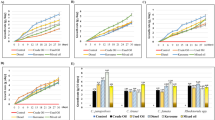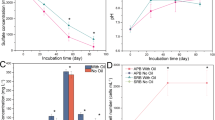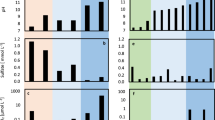Abstract
MANY crude oil constituents are biodegradable in the presence of oxygen; however, a substantial anaerobic degradation has never been demonstrated1,2. An unusually low content of n-alkanes in oils of certain deposits is commonly attributed to selective utilization of these hydrocarbons by aerobic microorganisms3,4. On the other hand, oil wells and production fluids were shown to harbour anaerobic sulphate-reducing bacteria5–8, but their actual electron donors and carbon sources were unknown. On the basis of nutritional properties of various bacterial isolates it was assumed that fatty acids and H2 are potential electron donors for sulphate reduction in situ5–8. Here we demonstrate that hydrocarbons in crude oil are used directly by sulphate-reducing bacteria growing under strictly anoxic conditions. A moderately thermophilic pure culture selectively utilizesn-alkanes in oil for sulphate reduction to sulphide. In addition, a mesophilic sulphate-reducing enrichment culture is shown to oxidize alkylbenzenes in oil. Thus, sulphate-reducing bacteria utilizing aliphatic and aromatic hydrocarbons as electron donors may present a significant source of sulphide in oil deposits and oil production plants.
This is a preview of subscription content, access via your institution
Access options
Subscribe to this journal
Receive 51 print issues and online access
$199.00 per year
only $3.90 per issue
Buy this article
- Purchase on SpringerLink
- Instant access to the full article PDF.
USD 39.95
Prices may be subject to local taxes which are calculated during checkout
Similar content being viewed by others
References
Atlas, R. M. Microbiol. Rev. 45, 180–209 (1981).
Leahy, J. & Colwell, R. R. Microbiol. Rev. 54, 305–315 (1990).
Tissot, B. P. & Welte, D. H. Petroleum Formation and Occurrence 2nd edn (Springer, Berlin, New York, 1984).
Blanc, P. & Connan, J. in Applied Petroleum Geochemistry (ed. Bordenave, M. L.) 151–174 (Editions Technip, Paris, 1993).
Nazina, T. N., Rozanova, E. P. & Kuznetsov, S. I. Geomicrobiol. J. 4, 103–130 (1985).
Cord-Ruwisch, R., Kleinitz, W. & Widdel, F. J. Petrol. Technol. 97–106 (January 1987).
Rosnes, J. T., Torsvik, T. & Lien, T. Appl. environ. Microbiol. 57, 2302–2307 (1991).
Stetter, K. O. et al. Nature 365, 743–745 (1993).
Widdel, F. & Bak, F. in The Prokaryotes 2nd edn Vol. 4 (eds Balows, A., Trüper, H. G., Dworkin, M., Harder, W. & Schleifer, K.-H.) 3352–3378 (Springer, Berlin, New York, 1992).
Simoneit, B. R. T. & Lonsdale, P. F. Nature 295, 198–202 (1982).
Bazylinski, D. A., Farrington, J. W. & Jannasch, H. W. Org. Geochem. 12, 547–558 (1988).
Jørgensen, B. B., Isaksen, M. F. & Jannasch, H. W. Science 258, 1756–1757 (1992).
Bazylinski, D. A., Wirsen, C. O. & Jannasch, H. W. Appl. environ. Microbiol. 55, 2832–2836 (1989).
Postgate, J. R. The Sulphate-reducing Bacteria 2nd edn (Cambridge University Press, Cambridge, 1984).
Aeckersberg, F., Bak, F. & Widdel, F. Arch. Microbiol. 156, 5–14 (1991).
Rabus, R., Nordhaus, R. & Widdel, F. Appl. environ. Microbiol. 59, 1444–1451 (1993).
Beller, H. R., Grbić-Galić, D. & Reinhard, M. Appl. environ. Microbiol. 58, 786–793 (1992).
Edwards, E. A., Wills, L. E., Reinhard, M. & Grbić-Galić, D. Appl. environ. Microbiol. 58, 794–800 (1992).
Nielsen, H. et al. in SCOPE 43, Stable Isotopes (eds Krouse, H. R. & Grinenko, V. A.) 65–132 (Wiley, New York, 1991).
Orr, W. Amer. Assoc. Petrol. Geologists Bull. 58, 2295–2318 (1974).
Schidlowski, M., Hayes, J. M. & Kaplan, I. R. in Earth's Earliest Biosphere (ed. Schopf, J. W.) 149–186 (Princeton University Press, Princeton, 1983).
Rainey, F. A., Dorsch, M., Morgan, H. W. & Stackebrandt, E. Syst. appl. Microbiol. 15, 197–202 (1992).
Rainey, F. A. & Stackebrandt, E. FEMS Microbiol. Lett. 113, 125–128 (1993).
Jukes, T. H. & Cantor, C. R. Mammalian Protein Metabolism (Academic, New York, 1969).
De Soete, G. Psychometrica 48, 621–626 (1983).
Radke, M., Willsch, H. & Welte, D. H. Analyt. Chem. 52, 406–411 (1980).
Author information
Authors and Affiliations
Rights and permissions
About this article
Cite this article
Rueter, P., Rabus, R., Wilkest, H. et al. Anaerobic oxidation of hydrocarbons in crude oil by new types of sulphate-reducing bacteria. Nature 372, 455–458 (1994). https://doi.org/10.1038/372455a0
Received:
Accepted:
Issue date:
DOI: https://doi.org/10.1038/372455a0
This article is cited by
-
Methanogenic degradation of branched alkanes in enrichment cultures of production water from a high-temperature petroleum reservoir
Applied Microbiology and Biotechnology (2019)



